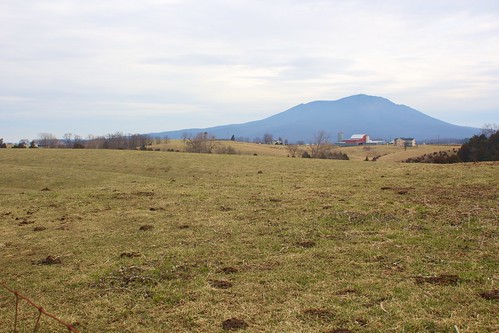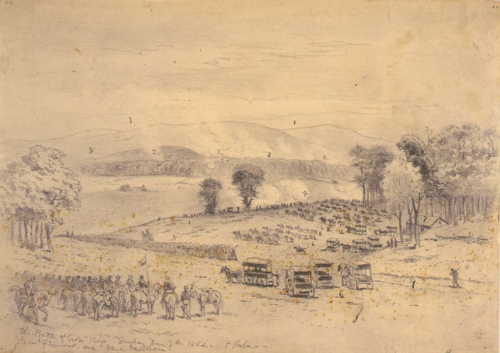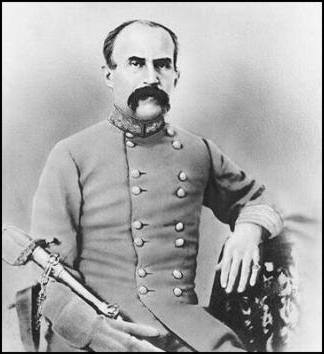On the morning of June 8th at 8:30 Fremont began moving cautiously against Ewell, who was near Cross Keys. He outnumbered Ewell two to run, but did not know it. He encountered the Confederates in a strong position along Mill Creek, with Steuart’s brigade on the left, Elzy in the center and Trimble on the right. Fremont had his line of battle formed by 10:00, and an artillery duel began. On the Confederate side, Trimble decided to advance his brigade ¼ mile forward to a better defensive position. Trimble was a sixty year old West Pointer and had turned his brigade of troops from four different states into a well trained fighting unit. Trimble's advance could have been dangerous because it opened up his flank, but it actually was safe because he was covered by artillery posted on the ridge he had left.
 |
| Cross Keys battlefield via CWT |
Trimble placed his troops along a fence on the edge of a rolling field. They hoped to catch a Federal unit by surprise, and that is just what happened. As Julius Stahel's brigade advanced toward Trimble it was making a serious mistake. Although he had served in the Austrian army and on the staffs of several European generals, he made the elementary mistake of advancing without skirmishers out in front. Skirmishers are a thin line of troops ahead of the main body. Their is to detect threats, fire a few shots, and fall back to the main body. Without those skirmishers, Stahel walked right into a trap. The 8th New York came over the hill toward the Confederate line completely ignorant of its position. At 40 yards Trimble's men stood up and fired a volley. The New Yorker's lines melted before the Confederate bullets. The Southerners continued to pour in volleys, and the Federals had no choice but to run in retreat. The 8th suffered terrific casualties. They lost 180 killed and wounded and 80 prisoners, making these volleys some of the most deadly of the war. These were about half of the Union casualties for the entire battle.

The aggressive Trimble was not content with his victory over the 8th New York. Reinforced by two of Elzy's Virginia regiments under Colonel Walker, he moved forward to attack the position from which the 8th had attacked. He moved troops around the Federal's left flank and after several attacks broke the Union line. Moving on, he next encountered William Bohlen's brigade. He attacked those four regiments, and after a fight Bohlen retreated. Trimble, forming his brigade on top of the hill, sent back to Ewell for orders. In the center and left of the Confederate line, the artillery duel had continued fiercely all this time. The men laid down to avoid getting hit, until finally the barrage came to an end when the ammunition ran out. Both Steuart and Elzy were wounded by the Union artillery fire. Milroy and Schenck's brigades moved forward toward Ewell's line when the barage ceased. There were several charges and counter charges, but no progress was made against the Confederate position. Fremont finally ordered his men to retreat. This lack of success was because Schenck had not fully engaged Ewell, and he had only done some light skirmishing. He only had one tenth of Milroy's casualties. The Confederate position was too strong to be taken by the Union commanders unless they had real initiative in making their attacks.
 |
| Issac R. Trimble |
Fremont, however, did not have that initiative. This was his first real battle. He decided to retreat, even though he had no real reason to. He had not tried a real attack, and his left had only been pushed back by Trimble, not completely broken. He still greatly outnumbered Ewell. But he was cautious, which overwhelmed all other considerations. Trimble requested permission from Ewell to continue his attacks, but Ewell refused. He had met with Jackson and it was decided that the two divisions would unite the next day and turn on Shields, leaving Trimble as a rear guard to hold off Fremont until the bridge at Port Republic was burnt. However, Trimble was so persistent that Ewell sent him on to Jackson. Jackson told him that he had to get Ewell to agree, so Trimble's attack was never made. The Confederates gathered up their dead and wounded and went to sleep to prepare for the next day.







0 comments:
Post a Comment